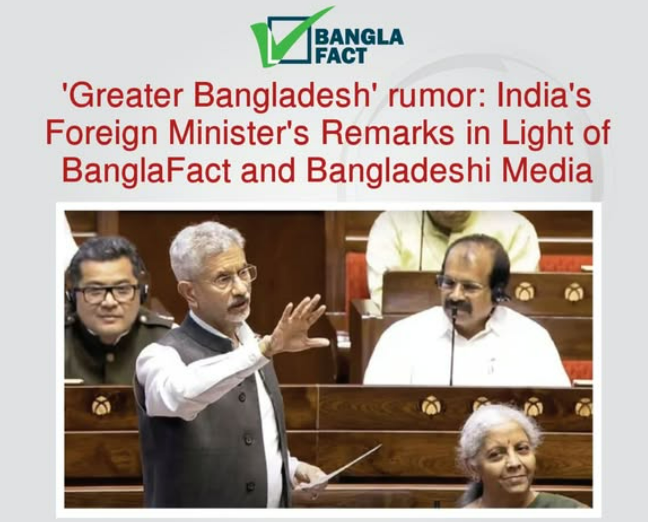India’s External Affairs Minister Dr. S. Jaishankar has directly addressed the swirling controversy over the so-called “Greater Bangladesh” map during a recent session of the Rajya Sabha, citing an investigative report by Bangladeshi fact-checking platform BanglaFact to dispel rumours propagated by segments of Indian media.
The controversy originated in mid-May, when several Indian outlets alleged that a Turkish-backed Islamist group based in Dhaka—identified as “Saltanat-e-Bangla”—was promoting a map that included parts of India under the banner of a “Greater Bangladesh.” The reports claimed the map had been displayed at the University of Dhaka and linked the group to a Turkish NGO called the “Turkish Youth Federation.”
However, speaking in response to a written question from Congress MP Randeep Singh Surjewala on July 31,2025, Jaishankar clarified that the Indian government had examined the issue thoroughly. “BanglaFact, a fact-checking platform run by the Government of Bangladesh, has stated that there is no evidence of the existence of any organization named ‘Saltanat-e-Bangla,’” he said.
According to BanglaFact’s May 20, 2025, investigation, the map in question was part of a historical exhibition organized by the Center for Bengal Studies (CBS) at the University of Dhaka on April 14, 2025, during celebrations for the Bengali New Year. The map depicted the territorial extent of the Bengal Sultanate—a medieval historical entity—and was displayed academic and cultural context.
The Indian Foreign Minister stressed that the CBS is not an NGO and has no ties to any Turkish or foreign political organization. “The organizers clarified that they have no affiliations with any foreign political groups,” Jaishankar noted. “The Government of India continues to closely monitor any incidents that may impact national security.”
Despite Jaishankar’s reference to the BanglaFact report, most Bangladeshi media coverage—including reports from Jugantor, Ittefaq, Jaijaidin, Inqilab, Somoy TV, and The Business Standard—largely echoed Indian narratives without conducting independent verification or providing deeper analysis.
The BanglaFact investigation stood as a rare counterpoint, establishing that the controversy was based on misinformation. The platform’s report confirmed that there was no political motive behind the map’s display and no evidence of the alleged Islamist group or Turkish influence.
Observers say the episode underscores the importance of rigorous fact-checking in defusing misinformation that could strain diplomatic ties.


